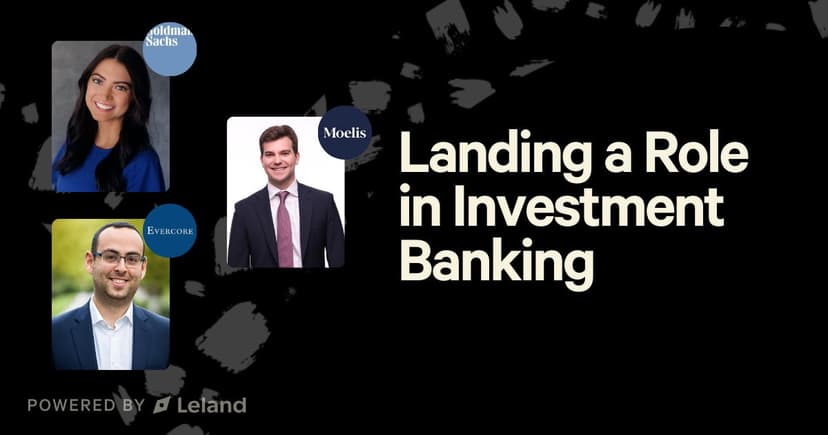How to Answer “Why This Firm?” and “Why Investment Banking?” in Interviews
Learn how to answer "why investment banking" with a clear, compelling framework, expert tips, and real examples from a TPG and Lazard alum.

By Ryan F.
Investment Banking Recruiting
Posted July 25, 2025

Join a free event
Learn from top coaches and industry experts in live, interactive sessions you can join for free.
Table of Contents
Hi, I’m Ryan F., an investment banking and private equity coach. I’ve helped hundreds of candidates navigate the IB recruiting process, from writing cover letters to mastering technicals, and one of the biggest stumbling blocks I see is answering the two most common behavioral questions: “Why investment banking?” and “Why this firm?” If you want personalized help preparing for interviews, feel free to book a free intro call on my profile. I’d be happy to work with you.
Now, there’s no sugarcoating it: investment banking interviews are intense. Between technical questions, deal discussions, and fit assessments, it can feel like there’s a mountain of material to prepare. But no matter the firm or format, two questions consistently show up in the first few minutes, and they often shape your first impression more than anything else.
That’s why preparing thoughtful, distinct, and well-structured responses to these questions is one of the highest ROI moves you can make. Interviewers are looking for clarity of intent, strong communication, and genuine motivation. Done right, your answers can set the tone for the entire conversation and show you’re not just a resume, but someone they’d want on the team.
In this article, I’ll break down what interviewers are really looking for in both responses, share a simple framework to follow, and give examples from my own experience as an intern and analyst at Lazard. Let’s dive in.
“Why This Firm?”
Interviewers want to see that you’ve done your homework and are genuinely excited about them, not just investment banking in general. A strong answer requires three components:
1. Conduct Research
First and foremost, it is important to spend quality time researching the firm that you are interviewing with – everything from the firm’s website content, LinkedIn posts, press releases, and SEC filings (if the firm is public) can be successfully leveraged. Throughout your research, you should be focused on pieces of insight that help you understand how the firm differentiates itself from its peers.
Every investment bank has a few key areas of differentiation; it could be a specific transaction type that they are leaders in, a cultural nuance, expertise in a specific industry, or something else. As you prepare for your interview, identify those differences as they will form the basis of the first piece of your response. Doing so will demonstrate to your interviewer that you are proactive, diligent, and thoughtful – and that you’ve done the work to understand what sets this career in investment banking apart.
My Lazard Example: “I’ve been following many different M&A transactions over the past several months, and one thing that has consistently impressed me about Lazard is how regularly they were engaged as the advisor to acquirors in highly complex Consumer & Retail transactions.”
2. Compound Research with Insight from Current Professionals
Almost every candidate understands the value of networking, but where many candidates go wrong is by only focusing on utilizing networking conversations to obtain interviews. While networking your way into interviews is definitely crucial, almost equally important is using those conversations to help you formulate answers to the fit questions that you’ll get in formal interviews.
With that in mind, you can differentiate yourself further by ensuring that you have done your firm research before you network with full-time professionals. Then, in coffee chats and other conversations, ask those investment bankers for their unique takes on the differentiators that you identified in your research. By weaving the highlights of their commentary into the response that you give in the interview, you can demonstrate that you have truly gone above and beyond in both your research and your networking.
My Lazard Example: “I’ve spoken with a few of your colleagues about this, and one of the interesting insights that they shared with me was how your firm’s expertise on the buy-side contributes to their ability to develop long-term relationships with acquisitive clients where Lazard is often engaged as an analytical thought-partner across a wider variety of multi-year strategic initiatives.”
3. Relate to Analyst Experience
Many candidates make the crucial mistake of concluding their response with their comments about the firm. However, by tacking on an additional sentence or two about how a firm’s differentiators contribute to the experience that you think you’ll have as an analyst, you can further emphasize qualities about yourself – like your work ethic or your intellectual curiosity – that will help you stand out.
My Lazard Example: “I think Lazard’s clear strength in these areas provides hard-working analysts with an unrivaled opportunity to develop a highly technical skill set while maintaining a broader strategic perspective, which is exactly what I’m looking for out of an analyst program. I’m excited about the steep learning curve and the chance to contribute meaningfully right away, which I see as critical to building a strong foundation for a long-term investment banking career.”
As this article hopefully demonstrates, every response to an interview question is an opportunity for you to demonstrate something positive about your candidacy. With thoughtful preparation and guidance, every candidate has the potential to differentiate themselves throughout every step of their interview process. Please don’t hesitate to reach out to me if I can help formulate your response to this question or the most common investment banking interview question, “Tell me about yourself,” which also has several elements that make it much more complex than it seems on its surface! Book a free intro call on my profile to get started.
“Why Investment Banking?” – What Interviewers Are Really Looking For
This interview question may sound simple, but your response signals a lot more than enthusiasm. Interviewers are assessing your motivation, clarity, and long-term fit. They want to know:
- Are you genuinely interested in investment banking, or just chasing prestige and money?
- Do you actually understand what an investment banking career looks like, including the long hours, demanding clients, and steep learning curve?
- Can you explain why this investment banking role, specifically, makes sense for your background and goals?
A bad answer to the “Why Investment Banking?” question tends to be vague: “I want to learn a lot,” or “It’s a great way to start a career in finance.” A good answer connects your past experiences, interests, and career goals to the unique nature of the job.
An even better one – what I’d call a compelling response – shows your thought process. Why investment banking over private equity, consulting, or corporate finance? Why are you choosing this path with eyes wide open, even knowing about the long hours and pressure?
Top candidates show they’ve talked to junior bankers, observed the day-to-day intensity, and still feel extremely excited by the challenge. They understand that the steep learning curve, constant exposure to institutional clients, and the rigor of financial modeling offer the fastest way to build a well-rounded skill set in finance.
They also recognize that banking isn’t just a stepping stone to exit opportunities like hedge funds, financial sponsors, or corporate development – it’s a serious career choice in its own right. And whether they stay long-term or not, they can articulate how this role fits into a bigger plan.
When you answer the why investment banking question well, you demonstrate that you’re prepared, self-aware, and intentional. You move beyond the common answers and show why you’ll thrive in this career.
How to Structure Your Answer
When interviewers ask, “Why investment banking?”, they’re trying to gauge whether you’re both personally committed and professionally prepared. To stand out, you need more than surface-level interest – you need a clear story that connects the dots between your past experiences, your skill set, and your future goals.
I recommend using a three-part framework that’s simple but powerful:
1. Interest: The Spark
Start with what initially drew you to investment banking. This could be a corporate finance course, a student investment group, reading about high-profile transactions, or a conversation with a mentor who’s a finance major. Keep it personal but grounded. Avoid vague clichés like “I wanted to challenge myself” unless you back them up with substance.
2. Skills Fit: Why You’re Equipped for the Role
Connect your background to the skills required in the analyst job. Maybe you thrive in high-pressure environments, have built strong time management skills balancing academics and internships, or have a head for detail through audit or research work. Emphasize technical exposure, analytical rigor, or any hands-on experience with financial modeling, pitch books, or comparing different business models. Show them you’re not coming in cold—you’ve already started building the toolkit.
3. Long-Term Alignment: Where It’s Going
This is where you show you’ve thought beyond the offer letter. Whether you’re targeting private equity, corporate development, or sticking with an investment banking career, explain why this role fits into your trajectory. Interviewers want to see that you're not just opportunistically chasing prestige, but have a strategic reason for choosing this job, this path, and this moment.
How to Balance Personal and Professional Logic
One of the biggest mistakes candidates make is leaning too far in one direction. Too personal, and it feels disconnected from the job. Too professional, and it sounds robotic.
A strong answer weaves both:
- Use the personal story to explain how you discovered your interest.
- Use professional logic to explain why it makes sense.
Here’s a structure I give my coaching clients: Personal spark → validation through experience → logical next step based on skills and goals.
Example answer:
“I first got interested in investment banking through a finance class where we modeled companies across different business models. I liked how technical the work was, but also how strategic. That pushed me to intern at a boutique bank, where I worked on two live transactions, including one for a financial sponsor. I enjoyed how fast-paced it was, the direct exposure to institutional clients, and learning from senior bankers who helped me level up my technical skills quickly. Long-term, I want to build a well-rounded skill set in valuation work, deal execution, and client service—and I see this analyst role as the best foundation for that, whether I pursue private equity, corporate development, or continue growing in banking.”
This version is compact, personalized, and shows that you’ve done the reflection to answer why investment banking with clarity and conviction.
Common Mistakes to Avoid in Both Answers
- Generic answers like “I want to learn” or “your firm is the best” signal low effort. These are red flags that you haven’t done the research or don’t understand what makes one investment banking role different from another.
- Copying firm taglines or giving prestige-driven responses (“You’re a top firm”) shows you haven’t thought deeply about what actually matters in your investment banking career.
- Telling a purely personal story (e.g., “I’ve always been interested in finance”) without linking it back to the specific firm, team culture, or skills required in the role.
- Overusing buzzwords without backing them up. Words like “team player” or “fast-paced” are fine, but they need proof.
- Sounding overly rehearsed or robotic. Interviewers can tell when you’ve memorized a script. Aim for structured but conversational.
- Overlooking the analyst lens. Your answer should reflect that you understand what junior bankers actually do: long hours, intense modeling, collaborating with senior bankers, and managing competing client demands.
- Ignoring your audience. If you're talking to a financial sponsors group or a firm known for capital markets, tailor your examples accordingly.
How to Deliver Your Answers with Confidence
Keep it to 60–90 seconds. Brevity signals clarity. You can expand during follow-ups. Practice enough to internalize the structure, not memorize a script. You want to sound polished, not rehearsed. Also, be ready for common follow-ups, such as:
- “Tell me more about that live transaction you mentioned.”
- “What makes our firm different from others you’re interviewing with?”
- “How does this fit into your long-term career goals?”
Anchor your answers in real conversations. If you spoke with investment bankers at the firm, mention it. It adds credibility and depth. Next, highlight one or two deals, industries, or insights that stood out in your research, and be prepared to explain why. And finally, stay calm if interrupted. Many interviewers will cut in to test your composure. That’s normal. Stay flexible and engaged.
Get Personalized Help from Top IB Coaches
Whether you need help structuring your story, refining your delivery, or preparing for live interviews, I also offer 1:1 coaching tailored to your goals. I’ve coached 100+ students through this process and have sat on the other side of the table, grading, modeling tests, and evaluating candidates. Book a free intro call with me to start building your edge.
Related articles:
- The Top 10 Investment Banks – By Size & Tier
- Investment Banking Technical Interview Questions & Answers
- Investment Banking: What it Is & How it Works
- An Expert’s Guide to Resumes: Five Tips to Make You Stand Out
- What do Investment Banks Actually Do?
- The Best MBA Programs for Investment Banking
- 20+ Best Questions to Ask at the End of an Interview
- How to Pass the Consulting Screening Interview
- The Best Finance Newsletters & Podcasts to Subscribe To
- How to Prepare for a Career in Investment Banking
FAQs
Why do you choose investment banking?
- Investment banking is known for offering lucrative salaries and bonuses, especially for entry-level positions. This financial incentive is a major attraction. Prestige and Reputation: Working in a top investment bank is often associated with prestige and a high social status
How do you stand out in an investment banking interview?
- Give the interviewer a story that shows your achievements and how everything fits together for you to be a successful investment banker. Make sure to point out how each job has let you take on more responsibility, or required you to acquire more finance/business knowledge than the one before it.
What is your greatest strength in investment banking?
- Here are some tips for answering this question: Choose two or three strengths that are relevant to investment banking. Some examples of strengths that are valued in investment banking include analytical skills, problem-solving skills, attention to detail, communication skills, and teamwork skills.
Why does everyone want to go into investment banking?
- The answer is simple: Money. Investment bankers make a lot of money. Some first-year investment bankers make up to $190,000, which is outstandingly large compared to the average salary of an American one year out of undergraduate, around $70,000. Investment banking also provides great exit opportunities.
Why do you want to work in investment management?
- Working in investment management is often an intellectually stimulating and engaging career choice. This is because successful investment management requires you to remain up to date on the latest market analysis and investment strategies.

Written by Ryan
5.0
(5)
Hi! I’m Ryan Fogarty, and I’m an investor at TPG Growth. I attended Brigham Young University, where I studied Finance and graduated in 2018. During my time at BYU, and largely due to the mentorship and coaching of other BYU students and alum, I became familiar with Investment Banking and Private Equity and was attracted to the unique platform for professional growth that beginning a career in those industries provides. While I was attracted to those industries and the opportunity that they could provide, I had no experience and no idea about where to start. Fortunately for me, BYU had a strong ecosystem of resources and mentors that I had the opportunity to utilize to build my resume and prepare for interviews, which ultimately led to an investment banking internship with Lazard in their New York City office. Before going back to Lazard full-time, I helped lead BYU’s Investment Banking Club as a Co-President, where I had the unique opportunity to coach 100+ students through the challenging process of preparing for investment banking recruiting. Shortly after beginning working at Lazard, I went through the hectic on-cycle private equity recruiting process and landed a role at TPG, where I currently work as an Associate on the Consumer Growth team. In addition to my “typical” Associate responsibilities at TPG, I’ve been involved with our fund’s on-cycle recruiting process and have led the administration and grading of our firm’s modeling case study. On top of that, I had the unique opportunity to work on TPG’s January 2022 Initial Public Offering, where I gained unique insight into the competitive landscape and differentiation of a wide variety of the major publicly traded private equity firms (Apollo, Ares, Blackstone, Carlyle, EQT, KKR, etc.). Outside of work, you can find me skiing and/or riding my bike around the Wasatch mountains in Salt Lake City.
Ryan has helped clients get into organizations like:
























